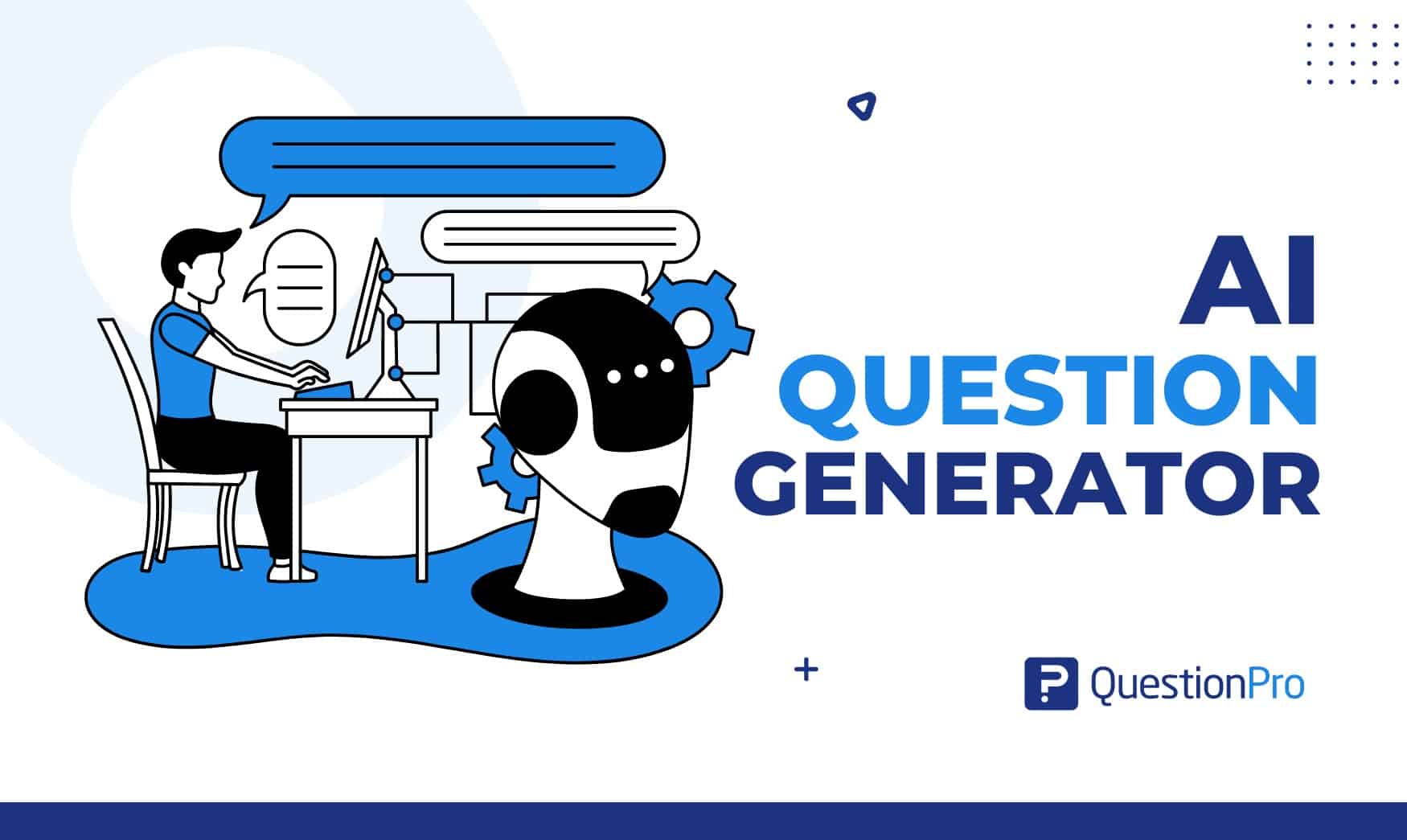
Many educators and organizations find creating adequate surveys and tests that generate actionable feedback time-consuming. As we understand that time is a valuable asset, we’re bringing you to the new age of data in the most comfortable way possible. We can’t deny that AI is already playing a big role in daily life, but it doesn’t have to be an obstacle when we can already take advantage of it. Let us introduce our latest AI question generator and your new best friend: QxBot.
We’re using the power of artificial intelligence to turn the survey creation process into better, more effective, data-driven decision-making.
FREE AI QUESTION GENERATION:
What is an AI Question Generator
An AI question generator is a software that allows machine learning algorithms to automatically generate survey questions based on predefined criteria and goals. These systems analyze existing data, identify patterns, and understand the context of the quiz or survey to create custom questions that collect relevant and insightful responses from respondents.
The process of collecting actionable data through surveys and tests can be not only time-consuming but also resource-intensive and prone to human error. An AI question generator can be a great solution for designing and conducting surveys for companies and organizations with limited time or staff. Algorithms and machine learning techniques are getting increasingly reliable, and we’re confident the AI question generator is the most recent hit of survey creation.
A smart and quick survey creation process saves time and resources while ensuring the generation of high-quality, relevant questions. AI question generators can help companies and organizations develop more efficient, effective, and insightful surveying practices. Below, we put together a helpful table to help you identify some of the issues that companies face and how an AI question generator can help solve them:
| Issue | How AI Question Generator Can Solve It |
|---|---|
| Time-consuming survey creation | Automates the process of generating survey questions, saving time and resources for organizations. |
| Lack of expertise in survey design | Employs advanced algorithms to generate high-quality questions aligned with survey goals, regardless of the user’s level of expertise. |
| Limited creativity and innovation | Provides smart suggestions for question wording and structure, enhancing creativity and innovation in survey design. |
| Inconsistent question quality | Provides standardized question formats and guidelines for creating surveys, ensuring consistency in survey structure and resulting in more reliable and comparable data. |
| Difficulty in tailoring questions to audience preferences | Tailors question the preferences and demographics of survey participants, increasing engagement and response rates. |
| Inefficient feedback collection | Provides standardized question formats and guidelines for creating surveys, ensuring consistency in survey structure and resulting in more reliable and comparable data. |
| High survey abandonment rates | Creates engaging and relevant surveys that are easy to understand, reducing survey abandonment rates and increasing participation. |
| Limited insights from survey data | Improves the quality and relevance of survey data by generating insightful questions that elicit valuable responses from participants. |
| Overwhelming manual survey design process | Simplifies the survey design process by automating repetitive tasks and providing intelligent suggestions for question wording and structure. |
| Difficulty in identifying emerging trends | Enables organizations to identify emerging trends and patterns in survey data by providing timely and relevant insights through well-crafted questions. |
| Challenges in driving data-driven decisions | Facilitates decision-making by providing access to accurate and actionable insights from survey data, empowering organizations to make informed choices. |
| Lack of consistency in survey structure | Provides question formats and guidelines for creating surveys, ensuring consistency in survey structure and resulting in more reliable and comparable data. |
The Importance of AI Quiz Generators in Survey Creation
The traditional approach to survey creation involves manual brainstorming sessions, trial and error, and extensive peer revisions, which can be time-consuming and labor-intensive and may result in inadequate outcomes. AI question generators, on the other hand, offer a more efficient and effective alternative by automating much of the survey design process.
One of the main benefits of the AI quiz generator is its ability to generate high-quality questions quickly and accurately. It uses advanced natural language processing (NLP) techniques. These tools can analyze the semantics and syntax of existing survey questions and identify common themes and topics to generate new questions that align with the survey’s goals.
A specific use for AI Quiz Generators is as a test maker for teachers, making the process faster and more fun.
They can help surveys be whole and well-balanced by suggesting question types, including multiple-choice, open-ended, Likert scale, and more. This versatility allows organizations to gather a wide range of participant feedback and insights, allowing them to make informed decisions and lead better development.
AI question generators can also fix the user experience by creating engaging, relevant, easy-to-understand surveys or quizzes. The questions are custom to preferences, demographics, and specifications, which allows organizations and teachers to increase response rates and collect more accurate and actionable information.
We Recommend Reading: Kahoot! Alternatives
Pros and Cons of AI Question Generators:
Pros:
- Time-saving: AI question generators automate the survey creation process, saving time and resources for organizations.
- Accuracy: These tools use advanced algorithms to generate high-quality questions that align with survey objectives.
- Versatility: AI question generators can create diverse question types to suit various survey scenarios and objectives.
- Improved user experience: Organizations and teachers can increase response rates and collect more valuable data by creating engaging and relevant surveys and tests.
Cons:
- Lack of human intuition: AI question generators may lack human survey designers’ nuanced understanding and creativity, resulting in less personalized questions.
- Limited customization options: While AI question generators offer flexibility in question types, they may not provide the same level of customization as manual survey design.
- Reliance on existing data: These tools generate questions using existing data, which may limit their effectiveness in novel or niche survey scenarios.
Conclusion
Insights are vital for teachers and organizations to stay competitive and drive continuous improvement among clients or students. AI question generators offer a great solution to survey and test creation challenges, aiming to facilitate the process and improve quality and decision-making. Start today!







